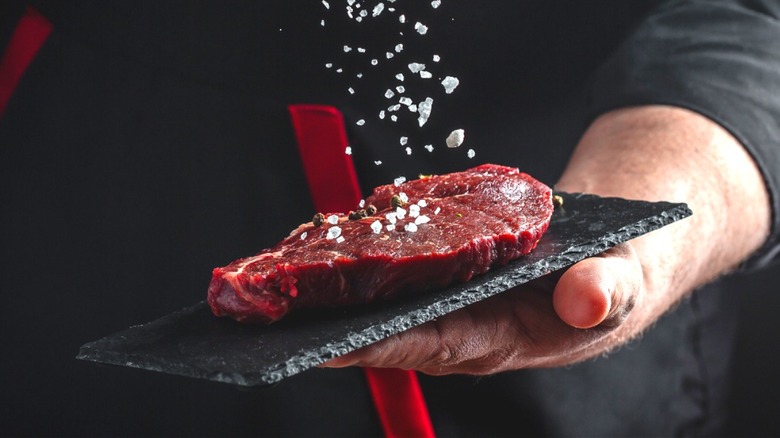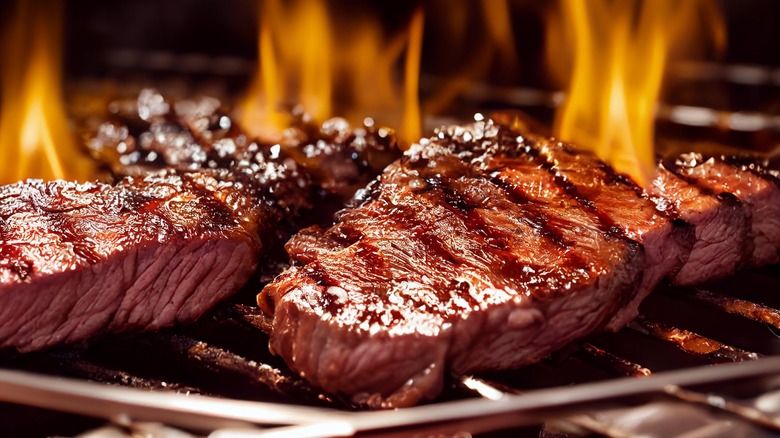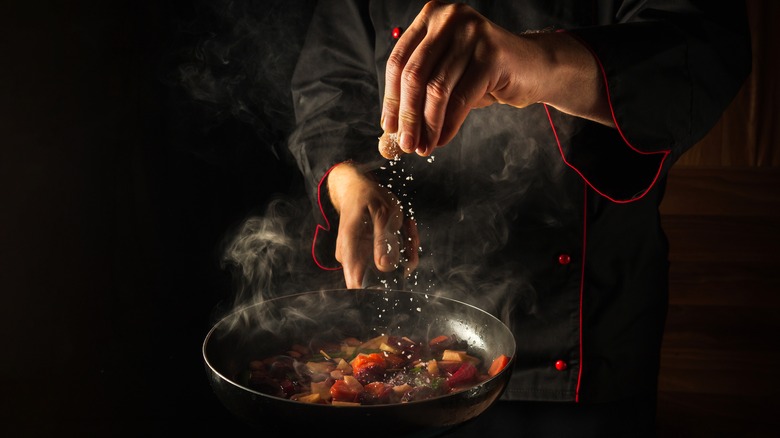The Best Way To Fix An Over-Salted Steak
There is nothing more sacrilegious than ruining a beautiful cut of meat. A perfect medium rare steak deserves to be respected whether it be in a restaurant or cooking at home. But, of course, accidents can happen. You can make the best red wine marinade or baste it with butter to your heart's content, but the minute your hand tips too far, there is no going back. Over-salting any cut of meat can dry it out at best and, at worst, make it inedible. Luckily for cooks, there is a way to salvage steak before it is too far gone.
Chef Raymond Southern, recommends the life-saving operation of a salt-cleaning bath. This essentially amounts to washing off the meat with hot water. It seems simple, but the chef swears by it, telling Food & Wine to dunk it and then "give it a really quick re-grill or sear, let it rest, and then serve." Southern's tactic isn't a miracle cure, and some meats are regrettably beyond saving. But even in such cases, there may be a way to salvage your meat even in the most dire of circumstances.
Add other ingredients to your steak
A salt-cleaning bath is a good way to rid your prized meat of excess salt, but it doesn't have to be a last-ditch effort. There are other ways to neutralize the salt while still in the cooking process. Queen of the kitchen herself, Martha Stewart, admits that there is no way to rid salt from the dish entirely once over-salted, but there are a few ways to rectify it. One aggressive solution to a steak on death's door is to add an acid while cooking. The trick is ensuring that whatever acidic ingredient you add pairs well with the meal. For steak, some kind of vinegar would be a likely addition, or juice from a lemon or lime in extreme circumstances.
Adding dairy is another way to counteract the taste of extreme saltiness in food. The good thing about dairy is that it goes well with steak. Start by basting the steak while it's on heat. Butter is never a bad thing; dousing a steak in it will absorb the flavor. If that fails, there is always the miracle of mashed potatoes. A welcome side dish to many steak dishes, the added butter will counteract a mishap with salt. But perhaps the most important takeaway is making sure to stop any mistakes in the kitchen in their tracks before they happen.
Careful how you season
The best strategy for sparing your tastebuds from over-salting is to avoid it altogether. Everyone wants to eat flavorful meals, but in many ways, using so much seasoning on a steak can be too much. That doesn't mean staying away from flavor, but it does implore cooks to use a more practiced hand so there are no salting accidents. Martha Stewart advises the best way to do this is to employ a practice used in cooking school. Removing seasoning is much harder than adding it. This fact is why schools recommend seasoning in layers. Start with a pinch of salt, and you can always add more throughout the preparation. Also, be aware of the type of salt you are using. Kosher salt, for instance, has a lighter flavor, so you can use more of it. Don't make this mistake with your run-of-the-mill table salt.
The only guaranteed way to make a delicious course without oversaturating it in salt is to taste it as you go. This way, you can season in layers and ensure that you are staying the course. Admittedly, this strategy may be a little more challenging with steak, especially if you are serving guests. If you have the opportunity, there is always the option of making an extra steak to taste and using the same measurements for the meal that will make it to the dinner table. Barring that, there's always takeout.


